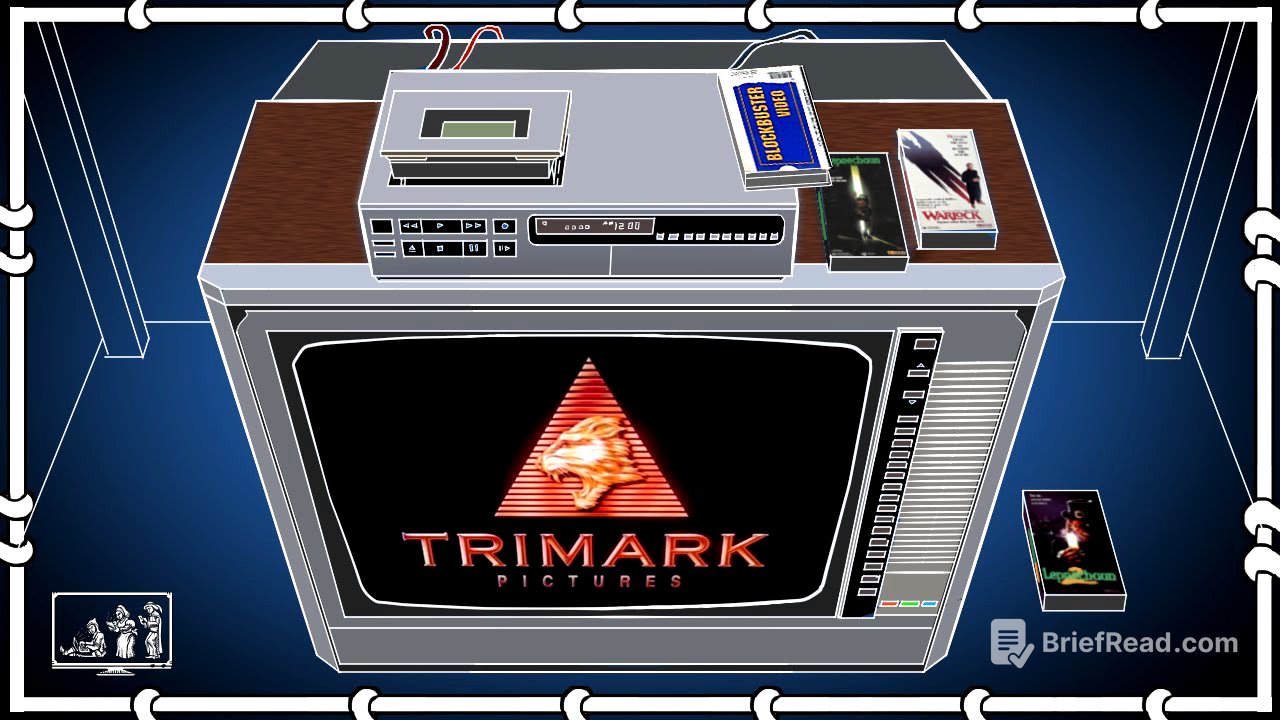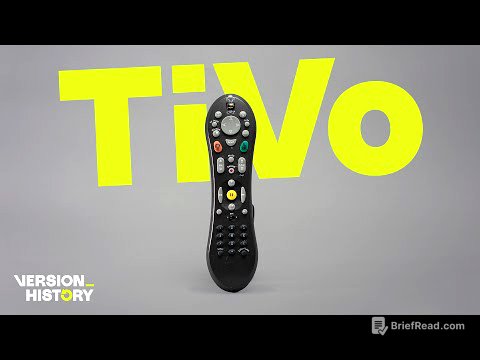TLDR;
This video explores the rise and fall of Trimark Pictures, a film studio that emerged from the home video boom of the 1980s and 90s. Starting as Vidmark Entertainment, a company focused on acquiring and distributing films for the home video market, Trimark eventually ventured into theatrical releases and various other ventures. Despite some successes, including "Warlock," "Leprechaun," and "Eve's Bayou," the company struggled to adapt to the evolving film industry and was eventually acquired by Lionsgate in 2000. The video highlights Trimark's marketing tactics, its diversification efforts, and the challenges it faced in a rapidly changing market.
- Vidmark Entertainment was founded in 1985, focusing on acquiring and distributing films for the home video market.
- The company benefited from the video store boom of the 1980s, becoming known for its marketing prowess.
- In 1991, Vidmark formed Trimark Pictures, venturing into theatrical releases with films like "Warlock."
- Trimark diversified into video games and other ventures but struggled to maintain its footing in the evolving home video market.
- Lionsgate acquired Trimark in 2000, phasing out its theatrical division and integrating its home video library.
The Rise of Home Video [1:32]
Home video was introduced in Japan in the mid-1970s with VHS and Betamax formats. The technology used magnetic cassette tapes to record, store, and play back video with a VCR. Initially marketed for recording TV programs, pre-recorded tapes of theatrical films were introduced in 1977. George Atkinson started renting out these tapes, establishing the video rental store concept. This allowed consumers to rent films easily, leading to a boom in video stores across the country.
Vidmark Entertainment's Origins [3:11]
Mark Amin, an Iranian-born entrepreneur, founded 2020 Video, a video rental store chain in Los Angeles, in 1981. By the mid-1980s, there were over 25,000 video retailers in the US. Amin and investors then co-founded Vidmark Entertainment in 1985 to acquire and distribute films for the home video market. Video stores bought tapes from distributors for $60-$90 and rented them for $2-$3.
Vidmark's Strategy and Early Success [5:15]
Vidmark Entertainment succeeded by releasing low-budget B movies and TV movies, benefiting from the 1980s video store boom. The company was known for its marketing, sometimes obscuring that their films were made for TV. Their home video release of the TV movie "Stage Coach" in 1986 sold 45,000 copies. Vidmark also distributed specialty tapes and acquired independent and foreign films, particularly in the science fiction and horror genres. In 1988, they entered film financing and theatrical releases, starting with the horror film "Demon Warp" and the slasher film "American Gothic."
Adapting to Market Changes [7:53]
By the late 1980s, video retailers shifted towards Blockbuster films due to consumer demand. Vidmark recognized the need for diverse inventories and offered a deal where they would refund 50% of the purchase price if a tape wasn't rented 15 times in the first month. In June 1990, Vidmark became a public company, but its stock dropped due to a home video market decline and economic concerns.
The Formation of Trimark Pictures [9:51]
In 1991, Vidmark formed Trimark Pictures for theatrical releases, aiming to increase revenue and boost their home video division. Their first release, "Warlock," was a hit, grossing over $9 million domestically. This success led to shipping 124,000 copies of "Warlock" on home video. Trimark released a diverse slate of films in 1991, and leveraged the theatrical market to create awareness for their movies.
Controversy and Home Video Success [11:20]
Trimark's release of "[ __ ]" in 1991 created controversy due to its depiction of sex workers, resulting in an NC-17 rating. Vidmark released four different versions of the film on home video to maximize market reach. Despite the controversy, the home video release of "[ __ ]" was successful, shipping 990,000 copies.
Evolving Market and Name Change [12:21]
1992 was a big year for the home video industry, but Vidmark's unit sales were flat due to larger corporations entering the market. In May 1992, Vidmark Inc. changed its name to Trimark Holdings Incorporated, with Vidmark still existing as the home video distribution wing. The company shifted towards theatrical film production, seeking low-budget projects with easy marketing hooks.
Leprechaun and Diversification [13:39]
Trimark released "Leprechaun" in 1993, which was successful both theatrically and on home video. Trimark then created Trimark Interactive, a video game division, planning to release games on Sega Genesis and Super Nintendo. The division released several games but was folded around 1996.
Theatrical Expansion and Profit Growth [15:13]
Following "Leprechaun," Trimark released several other horror films and expanded its theatrical offerings. Profits increased by 50% for the 1993 fiscal year, with revenues exceeding $60 million.
Challenges in the Evolving Home Video Market [16:07]
The home video market continued to evolve, with sell-through units becoming cheaper and major studios entering the straight-to-video market. Small, family-owned video stores were being bought up by larger chains, reducing shelf space for Trimark's specialized films.
New Territories and Controversial Acquisitions [17:39]
To combat market challenges, Trimark acquired older low-budget films with future stars and ventured into children's content and alternative sports. They also leaned into controversy, acquiring the home video rights to "Kids" and the director's cut of "Natural Born Killers."
Financial Struggles and Shift in Strategy [19:11]
In early 1997, Trimark reported an $8 million loss, with the home video market becoming increasingly tough. The company decided to focus on theatrical films and changed Vidmark's name to Trimark Home Video.
Mainstream Films and Box Office Disappointments [20:11]
Trimark lined up a roster of mainstream films, including "Meet Wally Sparks" and "Chairman of the Board," but these films were box office disasters.
Success with "Eve's Bayou" and Shift to Niche Films [21:28]
"Eve's Bayou," a drama film financed and released by Trimark in 1997, proved to be a sleeper hit, earning $14 million domestically. Trimark switched its focus to niche specialty films with Oscar potential.
Competition in the Indie Market and Financial Losses [22:34]
Trimark's entry into the prestige indie market coincided with increased competition from major studios. By mid-1998, the company was still struggling, posting a net loss of $5 million.
Cost Cutting and Rumors of Sale [23:54]
Trimark cut back, laying off 15% of its staff, and rumors began that Trimark Holdings was up for sale. Mark Amin stated that the company would focus on specialized theatrical releases and genre films for television and home video.
Focus on Home Video and New Technologies [24:22]
By late 1998, Trimark was fairing better, thanks to straight-to-video films and releases on DVD. The company explored internet distribution, signing a deal with broadcast.com and launching cinemanow.com.
Partnerships and Theatrical Struggles [25:22]
Trimark signed a deal with NBC to release "Saturday Night Live" compilations on DVD and video, which were successful. However, the company still lacked success in the theatrical department.
Acquisition by Lionsgate [26:07]
In May 2000, Lionsgate Entertainment was in talks to acquire Trimark Holdings. The acquisition would give Lionsgate an established infrastructure for home video distribution and a library of over 600 films.
Merger and Legacy [26:56]
In June 2000, Lionsgate acquired Trimark for $50 million in cash and stock, assuming its $35 million debt. Mark Amin became the vice chairman of Lionsgate, and Trimark's theatrical division was phased out. The Trimark label was dropped by the end of 2001. Lionsgate expanded further, releasing oscar-winning films and developing successful franchises.









